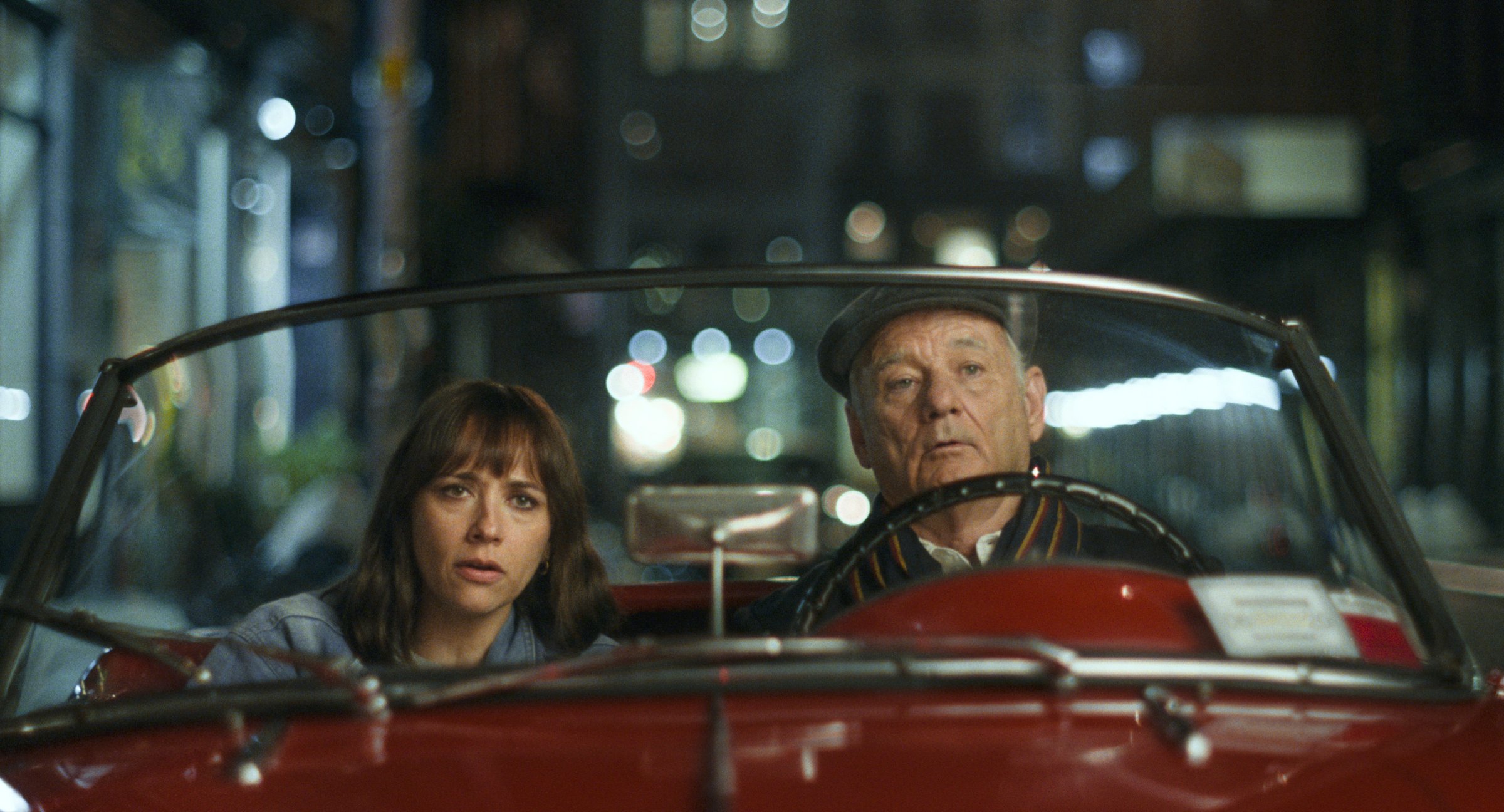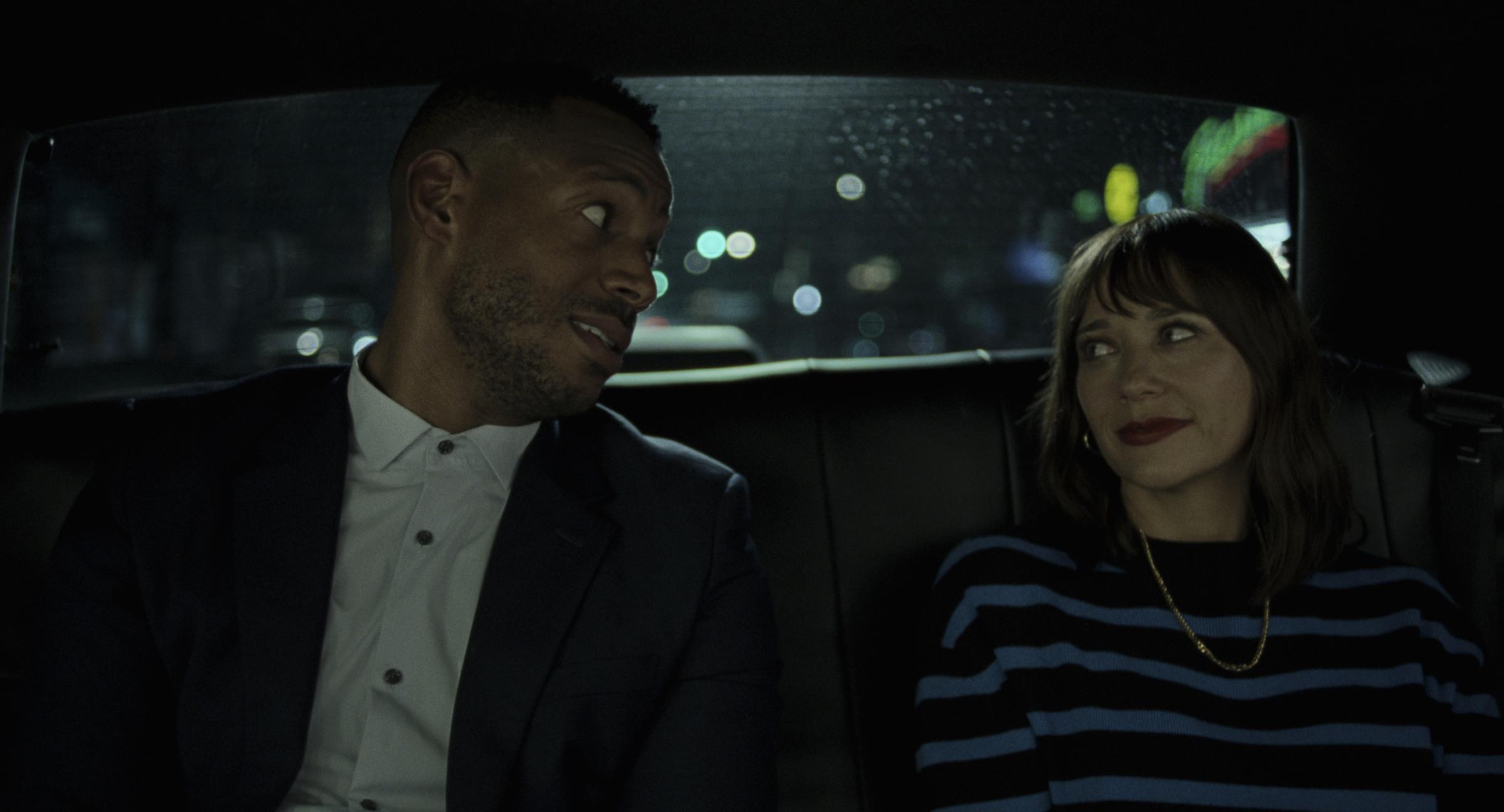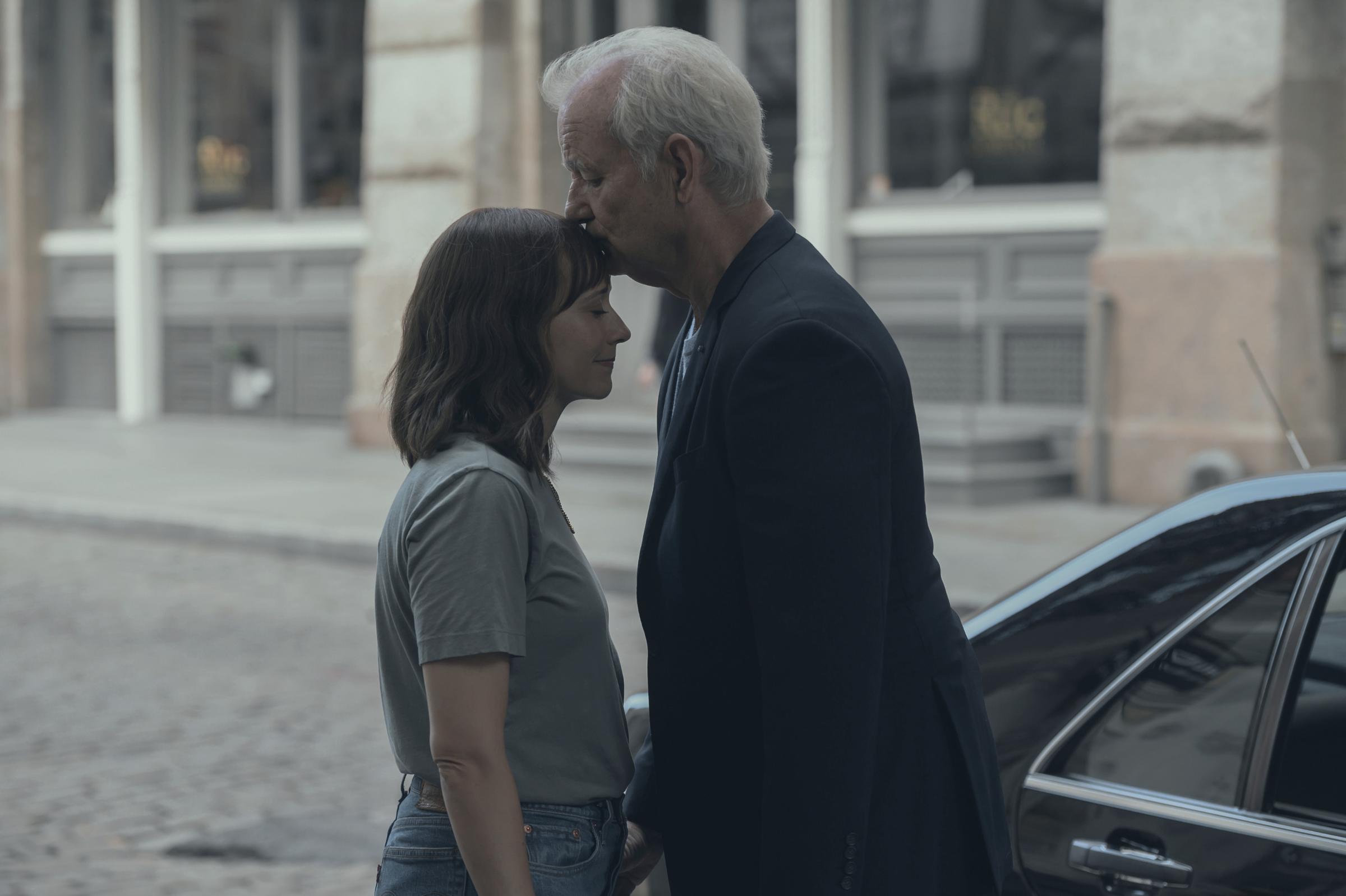
Very rarely is there pleasure to be had in anxiety, except, sometimes, in the movies, where a smart filmmaker can brush it with just enough glitter dust to draw us in. In Sofia Coppola’s wistful New York fairytale-caper On the Rocks, Rashida Jones plays Laura, a New Yorker with a problem: she has what appears to be a dream marriage—to Dean, a thoughtful husband and successful businessguy, played by Marlon Wayans—and two audaciously adorable little girls. But she thinks Dean might be cheating on her with one of his co-workers. Everything feels a little out of whack: she’s a writer, but her next book is stuck in nowheresville. And she thinks, maybe, that she’s become boring, a woman pushing 40 who’s left all her dazzle behind her.
Into this picture steps a man whose dazzle just keeps dazzling, unaffected by age, a globe-trotting playboy and semi-retired art dealer who travels with supplies of takeout caviar and thinks nothing of whipping up dinner-spoiling egg creams for his grandkids. That man is Laura’s father, Felix, played by Bill Murray. Felix is overprotective yet emotionally irresponsible; at the merest suggestion that his daughter might need him, he swoops in to help, only to come close to taking over her life.
That’s the essential plot of On the Rocks: There’s no tortured drama, no grand revelation. The movie is funny in the gentlest way, and how could it not be? Coppola’s script is built around Murray’s deadpan savoir faire, with Jones’ forthright radiance as a foil. But with this, as with all of Coppola’s pictures, it’s the layering of details that counts, the accretion of sly but not minor observations that come to form the whole, like the stippled strokes of a Seurat painting. Laura and Dean have money, and Laura also comes from money: Her office is a bare, breezy, loftlike room with floor-to-ceiling windows, almost like an inside-joke version of a writer’s ideal office. Virtually no one who writes for a living could afford this kind of real estate, but that’s precisely the point—Laura doesn’t need to write for a living. Her work is part of her identity, but the movie isn’t about that kind of struggle. Instead, this is a clever and dexterous look at the way modern life, even a cushy modern life, can throw tricky curve balls—and a reminder that having money never protects you from loneliness and confusion.

Laura knows her husband loves her, but she also feels forgotten. The movie opens with a look back at the couple’s wedding in some exquisite, probably European hotel; they sneak away from the party to find a tucked-away marble swimming pool. Dean is the first one in, and he waits for her. She strips down to her wedding veil and little else and makes the jump, a metaphor for the seductive adventure of marriage if ever there were one. But that scene is only a flashback fragment. Most of the movie takes place in Laura’s here and now. Dean is preoccupied with work, and she’s left, mostly, to chase after the kids, to hustle the older one off to school, to get the two of them tucked into bed. She loves it all, but she feels self-doubt creeping in around the edges, and that uncertainty seeps into her life with Dean.
Laura knows better than to confess that apprehension to Felix, who has just swept into town, his big personality in tow. He and Laura’s mother have been long divorced, and late in the film, we get some sense of the pain he caused when he cracked the family apart. But his love for Laura is never in doubt. When, even against her better judgment, she confides her troubles to him, he peppers her with unwanted advice. “You need to start thinking like a man,” he tells her. She responds with an eye roll that suggests she’s seen it all, though she never lets him off the hook. Her skepticism about his crazy disco-ball worldview is part of their dynamic, and he clearly loves it. Felix specializes in outlandish pronouncements about romantic relationships: as the two sit down for lunch at a fancy gentleman’s club, he offers an especially amusing, if chauvinistic, explanation of how the fair sex came to be attractive to men. (A chief factor is their lack of facial hair.) When he steers the conversation off-course, or toward himself, which is often—“Did I ever tell you about the Rockette I dated?”—Laura tugs him back like an ace shepherd retrieving a wayward sheep. But while Laura only has a vague fear that Dean might be cheating on her, Felix is so protective that he immediately assumes the worst. His best quality is also his worst; he ends up sweeping Laura further into a cobwebby corner of doubt, rather than helping her see her way out.

The tension between Felix and Laura is part of their magic together, but it also reminds Laura why she’s made the choices she has. That’s cemented in the movie’s final scene, a marvelous example of Coppola’s delicate touch, and a reminder that the world of a couple’s marriage is theirs alone to create. But Dean—though he’s played by Wayans with affable sensitivity—is largely absent from this story. It belongs mostly to Felix and Laura, and Jones and Murray step into these roles with puddle-jumping agility and grace. Anyone who has seen Coppola’s early signature film Lost in Translation (2003) has some sense of the affinity between Coppola and Murray. His lines come at you sideways, hitting maybe just a little left of center—but they always hit. His indirect directness is a lot like Coppola’s; instead of forcing a movie into shape, she gives the impression that everything has just settled into place of its own accord, even if that’s that’s hardly the reality. Here, Murray is a rogue charmer, a bamboozler extraordinaire. But he also shows us Felix’s ability to enjoy life on a surprisingly granular level: Felix has sent Laura an impossibly lush bouquet of roses for her birthday (Dean is on a business trip and won’t be there to celebrate with her), and when he spots them on her counter, he leans in for a deep whiff, snorting like a contented piglet. And Jones, a vibrant and perceptive actor, matches Murray beat for beat. When he zigs, she zags, challenging him to follow. Their dance has a prickly, electric warmth.
And for the space of this movie, the city of New York is both theirs and ours. Coppola and cinematographer Philippe Le Sourd show us a place that’s half real and half dreamy, a kind of early-Woody Allen-style reverie without any of Allen’s bitterness. By day, even the ordinary sights Laura passes as she’s zipping about—drugstores and dry-cleaners, bodegas and shoe-repair shops—glow with workaday vitality. At night, the city lights splash out in Jolly Rancher colors. At one point Felix whisks Laura off to the Bemelmans Bar for a drink: the walls, painted in soft tones with rabbits going about their anthropomorphic business, with schoolchildren lined up for an outing, with well-groomed gents lounging on park benches, form a kind of cozy jewel box, only it’s a jewel box for people. The New York of On the Rocks is a place where you can feel both special and lonely, with no contradiction between the two. It’s a place that always has you stretching toward something just out of reach, until you realize that the life you have in your hands, with all its random bumps and shaggy edges, is the treasure of real value.
More Must-Reads from TIME
- Cybersecurity Experts Are Sounding the Alarm on DOGE
- Meet the 2025 Women of the Year
- The Harsh Truth About Disability Inclusion
- Why Do More Young Adults Have Cancer?
- Colman Domingo Leads With Radical Love
- How to Get Better at Doing Things Alone
- Michelle Zauner Stares Down the Darkness
Contact us at letters@time.com